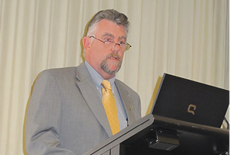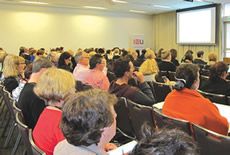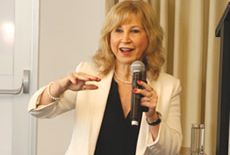The aim of the IEU’s Securing Our Future, Best Practice Induction and Mentoring Conference on 21 and 22 May was to ensure better conditions for early career teachers and their mentors were placed squarely on the political and industrial agenda.
Nearly 200 people, including practitioners in schools and early childhood settings, academics and employers attended on both days of the Conference, held at the University of Technology’s Aerial Function Centre in Sydney.
IEU General Secretary John Quessy said the Union had an obligation to advocate on behalf of early career teachers and their mentors.
BOSTES and the Teacher Quality Council in the ACT were “abrogating their responsibilities to the profession” if they did not establish minimum standards for induction and mentoring, John said.
The plight of teachers in early childhood settings, or in casual and temporary work, who had no access to stable and continuous relationships with colleagues and employers, particularly need to be addressed, he said.
“Any serious form of induction or mentoring is nigh impossible in these circumstances.
“The casualisation of the workplace, most particularly in the first five years after graduation, ensures many beginning teachers have no access to a formal mentor and are without rights to release time.
“Induction and mentoring must be an industrial and professional entitlement.”
IEU Federal Secretary Chris Watt said there were serious industrial implications to the Conference, and there were “unbelievably serious consequences from not doing this stuff right”.
“It’s not just about the profession it’s about the children in the classroom,” Chris said.
“The profession can only grow if issues around induction and mentoring are looked at. I congratulate the Branch for taking the initiative and putting it squarely and firmly on the political and industrial agenda.”
Keynote speaker Sean Kearney, Associate Dean in the School of Education, Notre Dame University, said up to half of new teachers leave the profession in the first five years after graduating.
“Is teaching the profession that eats its young?” he said.
Induction can reduce teacher attrition rates by 20%, which would save governments a lot of money.
Dr Kearney estimates that $240 million a year is wasted by not retaining beginning teachers. That figure does not include the cost of their university education.
Keynote speaker Philip Riley, Associate Professor of Educational Leadership, Australian Catholic University, presented his detailed findings on how schools understand mentoring, and how it differs from coaching and supervision.
“Mentoring should be seen as helping someone, not supervising them,” he said.
Associate Professor Peter Hudson from Queensland University of Technology and Dr Suzanne Hudson from Southern Cross University emphasised the importance of mentoring for young teachers, and challenged their audience to mentor a real life case study.
Dr Neville Ellis, Lecturer, School of Education at the University of NSW, explored how mentoring can be used as a dynamic collaboration process for effective professional learning.
Numerous workshops throughout the conference explored various aspects of induction and mentoring in school and early childhood settings.
More coverage of this conference is coming in the June copy of IE Magazine and in a video on the IEU website.











































































































































